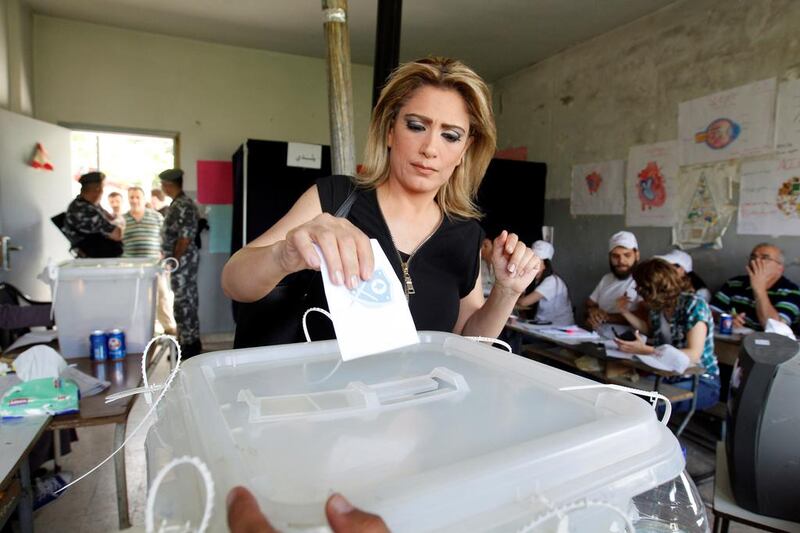Most Lebanese will not have heard of the recent rallies in Beirut by civil society figures gathering under an initiative named Humanist Lebanon. Some 200 of them have twice met near parliament to demand that parliamentarians do their constitutional duty and elect a president.
Lebanon has been without a president for more than two years. The small numbers mobilised by Humanist Lebanon, which was founded by lawyer Chibli Mallat and a group of like-minded individuals, is unlikely to change that. But what the initiative does show is that Lebanese civil society, for all its limitations, is alive and well in a country where much is unwell.
One of Lebanon’s shortcomings is also a great strength: its society, in many regards, is stronger than the state. To critics this has been best illustrated by the sectarian nature of the society, where the religious sects are more potent than anything arising under the banner of the state.
That may well be true, but there are also advantages in the dispersal of power and action in society. It has made for a much more flexible social structure when the state has failed to take on its responsibilities. Society has routinely filled the vacuum.
So, for example, challenges that would have overwhelmed state-centric societies elsewhere – such as the Syrian refugee crisis or even the Lebanese civil war between 1975 and 1990 – were somehow managed, albeit imperfectly, by Lebanon’s sectarian society. This usually happens until the situation improves and consensual solutions reimpose state authority.
The latitude granted by the state to society is one reason why Lebanese civil society seems to have a near endless capacity to come up with independent initiatives – political, social, or other. Many are perhaps duds, but not all are, and it is ingrained in the society that it is the privilege of citizens, even their duty, to think outside the realm of state institutions.
A case in point was the decision of a group of civil society activists to contest municipal elections in Beirut this year. The activists formed an electoral list named Beirut Madinati (Beirut, is my city), as a protest against the way the Lebanese capital has been run in recent years, with its municipal council dominated by political appointees.
While the list did not win the election, it received a remarkably high number of votes. This showed there was sympathy for candidates not in the pocket of the political class, who would have used their victory to ameliorate Beirut, not plunder it.
The election results were an embarrassment for the winning coalition list sponsored by the former prime minister Saad Hariri. However, they also showed that civil society, particularly when addressing political issues, has to think more about transforming its projects into political success, and not perpetually emerge as noble losers.
What civil society groups have learnt is that it is often best to focus on achievable aims, rather than to try changing the fundamentals of the political system. The political class will usually unite to protect its privileges, but is much more awkward when countering limited, reasonable goals.
One example came in 1992, when Lebanon held its first post-war parliamentary elections. A group of people joined together to establish an election-monitoring body known as the Lebanese Association for Democratic Elections. The interior minister at the time refused to recognise it, but the law on associations specifies that such recognition is unnecessary. So LADE began its task regardless. It continues to operate today, having exploited a legal breach the politicians had not anticipated.
One paradox of Lebanese society is that, although it is characterised by sectarianism, civil initiatives open the door to cross-sectarian cooperation. The Beirut Madinati list included both Christians and Muslims, as does LADE, as does Humanist Lebanon. Where the state has tended to reinforce sectarian stratification by functioning through sectarian leaders, civil society, particularly in its political projects, has regarded a cross-sectarian approach as vital to success.
In the Arab world the margin of manoeuvre granted to civil society varies. However, Arab regimes have tended to view political initiatives emanating from society as threatening. For the Lebanese, however, because their society is allowed to do so, engagement in politics is almost natural. Moreover, because of the diffuse nature of authority, the ability of the state to repress independent groups remains limited.
This does not mean that Lebanon would pass the test of a full-fledged democracy on the western model. However, in the spaces created by the state and by an often-divided political elite, society has functioned far more freely than in most other Arab countries. Lebanon’s political system may not be ideal, but it is deeply pluralistic, which civil initiatives can only reinforce.
That is why Humanist Lebanon and other similar actions should be taken seriously. They may not change Lebanon, but they underline that society refuses to cede its rights to politicians – a surprisingly subversive message in much of the region.
Michael Young is a writer and editor in Beirut
On Twitter: @BeirutCalling





